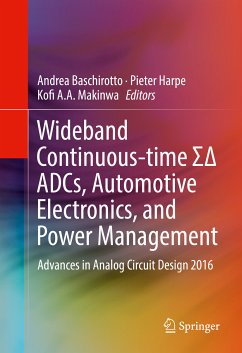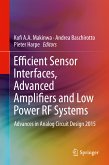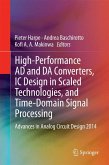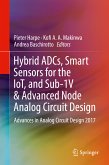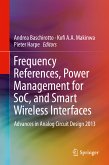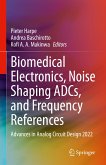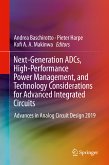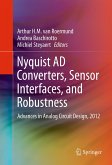Wideband Continuous-time ΣΔ ADCs, Automotive Electronics, and Power Management (eBook, PDF)
Advances in Analog Circuit Design 2016
96,29 €
inkl. MwSt.
Sofort per Download lieferbar
Wideband Continuous-time ΣΔ ADCs, Automotive Electronics, and Power Management (eBook, PDF)
Advances in Analog Circuit Design 2016
- Format: PDF
- Merkliste
- Auf die Merkliste
- Bewerten Bewerten
- Teilen
- Produkt teilen
- Produkterinnerung
- Produkterinnerung

Bitte loggen Sie sich zunächst in Ihr Kundenkonto ein oder registrieren Sie sich bei
bücher.de, um das eBook-Abo tolino select nutzen zu können.
Hier können Sie sich einloggen
Hier können Sie sich einloggen
Sie sind bereits eingeloggt. Klicken Sie auf 2. tolino select Abo, um fortzufahren.

Bitte loggen Sie sich zunächst in Ihr Kundenkonto ein oder registrieren Sie sich bei bücher.de, um das eBook-Abo tolino select nutzen zu können.
This book is based on the 18 tutorials presented during the 25th workshop on Advances in Analog Circuit Design. Expert designers present readers with information about a variety of topics at the frontier of analog circuit design, including low-power and energy-efficient analog electronics, with specific contributions focusing on the design of continuous-time sigma-delta modulators, automotive electronics, and power management. This book serves as a valuable reference to the state-of-the-art, for anyone involved in analog circuit research and development.
- Geräte: PC
- ohne Kopierschutz
- eBook Hilfe
- Größe: 18.58MB
- Upload möglich
Andere Kunden interessierten sich auch für
![Efficient Sensor Interfaces, Advanced Amplifiers and Low Power RF Systems (eBook, PDF) Efficient Sensor Interfaces, Advanced Amplifiers and Low Power RF Systems (eBook, PDF)]() Efficient Sensor Interfaces, Advanced Amplifiers and Low Power RF Systems (eBook, PDF)96,29 €
Efficient Sensor Interfaces, Advanced Amplifiers and Low Power RF Systems (eBook, PDF)96,29 €![High-Performance AD and DA Converters, IC Design in Scaled Technologies, and Time-Domain Signal Processing (eBook, PDF) High-Performance AD and DA Converters, IC Design in Scaled Technologies, and Time-Domain Signal Processing (eBook, PDF)]() High-Performance AD and DA Converters, IC Design in Scaled Technologies, and Time-Domain Signal Processing (eBook, PDF)149,79 €
High-Performance AD and DA Converters, IC Design in Scaled Technologies, and Time-Domain Signal Processing (eBook, PDF)149,79 €![Hybrid ADCs, Smart Sensors for the IoT, and Sub-1V & Advanced Node Analog Circuit Design (eBook, PDF) Hybrid ADCs, Smart Sensors for the IoT, and Sub-1V & Advanced Node Analog Circuit Design (eBook, PDF)]() Hybrid ADCs, Smart Sensors for the IoT, and Sub-1V & Advanced Node Analog Circuit Design (eBook, PDF)160,49 €
Hybrid ADCs, Smart Sensors for the IoT, and Sub-1V & Advanced Node Analog Circuit Design (eBook, PDF)160,49 €![Frequency References, Power Management for SoC, and Smart Wireless Interfaces (eBook, PDF) Frequency References, Power Management for SoC, and Smart Wireless Interfaces (eBook, PDF)]() Frequency References, Power Management for SoC, and Smart Wireless Interfaces (eBook, PDF)149,79 €
Frequency References, Power Management for SoC, and Smart Wireless Interfaces (eBook, PDF)149,79 €![Biomedical Electronics, Noise Shaping ADCs, and Frequency References (eBook, PDF) Biomedical Electronics, Noise Shaping ADCs, and Frequency References (eBook, PDF)]() Biomedical Electronics, Noise Shaping ADCs, and Frequency References (eBook, PDF)106,99 €
Biomedical Electronics, Noise Shaping ADCs, and Frequency References (eBook, PDF)106,99 €![Next-Generation ADCs, High-Performance Power Management, and Technology Considerations for Advanced Integrated Circuits (eBook, PDF) Next-Generation ADCs, High-Performance Power Management, and Technology Considerations for Advanced Integrated Circuits (eBook, PDF)]() Next-Generation ADCs, High-Performance Power Management, and Technology Considerations for Advanced Integrated Circuits (eBook, PDF)117,69 €
Next-Generation ADCs, High-Performance Power Management, and Technology Considerations for Advanced Integrated Circuits (eBook, PDF)117,69 €![Nyquist AD Converters, Sensor Interfaces, and Robustness (eBook, PDF) Nyquist AD Converters, Sensor Interfaces, and Robustness (eBook, PDF)]() Nyquist AD Converters, Sensor Interfaces, and Robustness (eBook, PDF)149,79 €
Nyquist AD Converters, Sensor Interfaces, and Robustness (eBook, PDF)149,79 €-
-
-
This book is based on the 18 tutorials presented during the 25th workshop on Advances in Analog Circuit Design. Expert designers present readers with information about a variety of topics at the frontier of analog circuit design, including low-power and energy-efficient analog electronics, with specific contributions focusing on the design of continuous-time sigma-delta modulators, automotive electronics, and power management. This book serves as a valuable reference to the state-of-the-art, for anyone involved in analog circuit research and development.
Produktdetails
- Produktdetails
- Verlag: Springer International Publishing
- Erscheinungstermin: 12. August 2016
- Englisch
- ISBN-13: 9783319416700
- Artikelnr.: 46972345
- Verlag: Springer International Publishing
- Erscheinungstermin: 12. August 2016
- Englisch
- ISBN-13: 9783319416700
- Artikelnr.: 46972345
Andrea Baschirotto graduated in Electronic Engineering (summa cum laude) from the University of Pavia in 1989. In 1994, he received the Ph.D. degree in electronics engineering from the University of Pavia. In 1994, he joined the Department of Electronics, University of Pavia, as a Researcher (Assistant Professor). In 1998, he joined the Department of Innovation Engineering, University of Lecce, Italy, as an Associate Professor. In 2007, he joined the Department of Physics, University of Milan-Bicocca, Italy, as an Associate Professor.
Pieter Harpe received the M.Sc. and Ph.D. degrees from the Eindhoven University of Technology, The Netherlands. In 2008, he started as researcher at Holst Centre / imec, The Netherlands. Since then, he has been working on ultra low-power wireless transceivers, with a main focus on ADC research and design. In April 2011, he joined Eindhoven University of Technology as assistant professor on low-power mixed-signal circuits. Since 2012, he is co-organiser of the yearly workshop on Advances in Analog Circuit Design (AACD). In 2013, he became member of the Technical Program Committees of ISSCC and ESSCIRC. In 2013, he received a 250.000euro `VENI' grant from the Dutch Technology Foundation STW for research on multi-functional ADCs.
Kofi Makinwa holds degrees from Obafemi Awolowo University, Ile-Ife (B.Sc., M.Sc.), Philips International Institute, Eindhoven (M.E.E.), and Delft University of Technology, Delft (Ph.D.). From 1989 to 1999, he was a research scientist at Philips Research Laboratories, where he designed sensor systems for interactive displays, and analog front-ends for optical and magnetic recording systems. In 1999 he joined Delft University of Technology, where he is currently an Antoni van Leeuwenhoek Professor of the Faculty of Electrical Engineering, Mathematics and Computer Engineering and Chair of the Electronic Instrumentation Laboratory.
Dr. Makinwa holds 18 patents, and has authored or co-authored 4 books and over 170 technical papers. He is on the program committee of the European Solid-State Circuits Conference (ESSCIRC) and the workshop on Advances in Analog Circuit Design (AACD). He has also served on the program committees of the International Solid-State Circuits Conference (ISSCC), the International Conference on Solid-State Sensors, Actuators and Microsystems (Transducers) and the IEEE Sensors Conference. He was a distinguished lecturer of the IEEE Solid-State Circuits Society (2008 to 2011) and a guest editor of the Journal of Solid-State Circuits (JSSC). He has given invited talks and tutorials at several international conferences including ISSCC, ESSCIRC, ASSCC and the VLSI symposium. At the 60th anniversary of ISSCC, he was recognized as one of its top ten contributing authors.
For his Ph.D. research, Dr. Makinwa was awarded the title of 'Simon Stevin Gezel' by the Dutch Technology Foundation (STW). In 2005, he received a VENI grant from the Dutch Scientific Foundation (NWO). He is a co-recipient of several best paper awards: from the JSSC (2), ISSCC (4), ESSCIRC (2) and Transducers (1). He is an IEEE Fellow, an alumnus of the Young Academy of the Royal Netherlands Academy of Arts and Sciences (KNAW) and an elected member of the AdCom of the IEEE Solid-State Circuits Society.
Pieter Harpe received the M.Sc. and Ph.D. degrees from the Eindhoven University of Technology, The Netherlands. In 2008, he started as researcher at Holst Centre / imec, The Netherlands. Since then, he has been working on ultra low-power wireless transceivers, with a main focus on ADC research and design. In April 2011, he joined Eindhoven University of Technology as assistant professor on low-power mixed-signal circuits. Since 2012, he is co-organiser of the yearly workshop on Advances in Analog Circuit Design (AACD). In 2013, he became member of the Technical Program Committees of ISSCC and ESSCIRC. In 2013, he received a 250.000euro `VENI' grant from the Dutch Technology Foundation STW for research on multi-functional ADCs.
Kofi Makinwa holds degrees from Obafemi Awolowo University, Ile-Ife (B.Sc., M.Sc.), Philips International Institute, Eindhoven (M.E.E.), and Delft University of Technology, Delft (Ph.D.). From 1989 to 1999, he was a research scientist at Philips Research Laboratories, where he designed sensor systems for interactive displays, and analog front-ends for optical and magnetic recording systems. In 1999 he joined Delft University of Technology, where he is currently an Antoni van Leeuwenhoek Professor of the Faculty of Electrical Engineering, Mathematics and Computer Engineering and Chair of the Electronic Instrumentation Laboratory.
Dr. Makinwa holds 18 patents, and has authored or co-authored 4 books and over 170 technical papers. He is on the program committee of the European Solid-State Circuits Conference (ESSCIRC) and the workshop on Advances in Analog Circuit Design (AACD). He has also served on the program committees of the International Solid-State Circuits Conference (ISSCC), the International Conference on Solid-State Sensors, Actuators and Microsystems (Transducers) and the IEEE Sensors Conference. He was a distinguished lecturer of the IEEE Solid-State Circuits Society (2008 to 2011) and a guest editor of the Journal of Solid-State Circuits (JSSC). He has given invited talks and tutorials at several international conferences including ISSCC, ESSCIRC, ASSCC and the VLSI symposium. At the 60th anniversary of ISSCC, he was recognized as one of its top ten contributing authors.
For his Ph.D. research, Dr. Makinwa was awarded the title of 'Simon Stevin Gezel' by the Dutch Technology Foundation (STW). In 2005, he received a VENI grant from the Dutch Scientific Foundation (NWO). He is a co-recipient of several best paper awards: from the JSSC (2), ISSCC (4), ESSCIRC (2) and Transducers (1). He is an IEEE Fellow, an alumnus of the Young Academy of the Royal Netherlands Academy of Arts and Sciences (KNAW) and an elected member of the AdCom of the IEEE Solid-State Circuits Society.
Part I CT MASH Architectures for Wideband ΔΣ Modulators.- 1 WiFi Receiver Evolution in a Dense Blocker Environment.- 2 WiFi Receiver Evolution in a Dense Blocker Environment.- 3 ΣΔ ADCs with Improved Interferer Robustness.- 4 Design Considerations for Filtering ΔΣ Converters.- 5 Blocker and Clock-Jitter Performance in CT ΔΣ ADCs for Consumer Radio Receivers.- 6 CT MASH Architectures for Wideband ΔΣ Modulators.- Part II – Automotive Electronics.- 7 Trends and Characteristics of Automotive Electronics.- 8 Next Generation of Semiconductors for Advanced Power Distribution in Automotive Applications.- 9 High-Voltage Fast-Switching Gate Drivers.- 10 A Self-Calibrating SAR ADC for Automotive Microcontrollers.- 11 Advanced Sensor Solutions for Automotive Applications.- 12 A Low Power Continuous Time Accelerometer Front End.- 13 Part III Power Management.- 14 Switched-Capacitor Power Converter Topology Overview and Performance Comparison.- 15 Switched-Capacitor Power Converter Topology Overview and Performance Comparison.- 16 Heterogeneous Integration of High-Switching Frequency Inductive DC/DC Converters.- 17 Heterogeneous Integration of High-Switching Frequency Inductive DC/DC Converters.- 18 Heterogeneous Integration of High-Switching Frequency Inductive DC/DC Converters.- 19 An Ultra-Low-Power Electrostatic Energy Harvester Interface.
Part I CT MASH Architectures for Wideband DeltaSigma Modulators.- 1 WiFi Receiver Evolution in a Dense Blocker Environment.- 2 WiFi Receiver Evolution in a Dense Blocker Environment.- 3 SigmaDelta ADCs with Improved Interferer Robustness.- 4 Design Considerations for Filtering DeltaSigma Converters.- 5 Blocker and Clock-Jitter Performance in CT DeltaSigma ADCs for Consumer Radio Receivers.- 6 CT MASH Architectures for Wideband DeltaSigma Modulators.- Part II - Automotive Electronics.- 7 Trends and Characteristics of Automotive Electronics.- 8 Next Generation of Semiconductors for Advanced Power Distribution in Automotive Applications.- 9 High-Voltage Fast-Switching Gate Drivers.- 10 A Self-Calibrating SAR ADC for Automotive Microcontrollers.- 11 Advanced Sensor Solutions for Automotive Applications.- 12 A Low Power Continuous Time Accelerometer Front End.- 13 Part III Power Management.- 14 Switched-Capacitor Power Converter Topology Overview and Performance Comparison.- 15 Switched-Capacitor Power Converter Topology Overview and Performance Comparison.- 16 Heterogeneous Integration of High-Switching Frequency Inductive DC/DC Converters.- 17 Heterogeneous Integration of High-Switching Frequency Inductive DC/DC Converters.- 18 Heterogeneous Integration of High-Switching Frequency Inductive DC/DC Converters.- 19 An Ultra-Low-Power Electrostatic Energy Harvester Interface.
Part I CT MASH Architectures for Wideband ΔΣ Modulators.- 1 WiFi Receiver Evolution in a Dense Blocker Environment.- 2 WiFi Receiver Evolution in a Dense Blocker Environment.- 3 ΣΔ ADCs with Improved Interferer Robustness.- 4 Design Considerations for Filtering ΔΣ Converters.- 5 Blocker and Clock-Jitter Performance in CT ΔΣ ADCs for Consumer Radio Receivers.- 6 CT MASH Architectures for Wideband ΔΣ Modulators.- Part II – Automotive Electronics.- 7 Trends and Characteristics of Automotive Electronics.- 8 Next Generation of Semiconductors for Advanced Power Distribution in Automotive Applications.- 9 High-Voltage Fast-Switching Gate Drivers.- 10 A Self-Calibrating SAR ADC for Automotive Microcontrollers.- 11 Advanced Sensor Solutions for Automotive Applications.- 12 A Low Power Continuous Time Accelerometer Front End.- 13 Part III Power Management.- 14 Switched-Capacitor Power Converter Topology Overview and Performance Comparison.- 15 Switched-Capacitor Power Converter Topology Overview and Performance Comparison.- 16 Heterogeneous Integration of High-Switching Frequency Inductive DC/DC Converters.- 17 Heterogeneous Integration of High-Switching Frequency Inductive DC/DC Converters.- 18 Heterogeneous Integration of High-Switching Frequency Inductive DC/DC Converters.- 19 An Ultra-Low-Power Electrostatic Energy Harvester Interface.
Part I CT MASH Architectures for Wideband DeltaSigma Modulators.- 1 WiFi Receiver Evolution in a Dense Blocker Environment.- 2 WiFi Receiver Evolution in a Dense Blocker Environment.- 3 SigmaDelta ADCs with Improved Interferer Robustness.- 4 Design Considerations for Filtering DeltaSigma Converters.- 5 Blocker and Clock-Jitter Performance in CT DeltaSigma ADCs for Consumer Radio Receivers.- 6 CT MASH Architectures for Wideband DeltaSigma Modulators.- Part II - Automotive Electronics.- 7 Trends and Characteristics of Automotive Electronics.- 8 Next Generation of Semiconductors for Advanced Power Distribution in Automotive Applications.- 9 High-Voltage Fast-Switching Gate Drivers.- 10 A Self-Calibrating SAR ADC for Automotive Microcontrollers.- 11 Advanced Sensor Solutions for Automotive Applications.- 12 A Low Power Continuous Time Accelerometer Front End.- 13 Part III Power Management.- 14 Switched-Capacitor Power Converter Topology Overview and Performance Comparison.- 15 Switched-Capacitor Power Converter Topology Overview and Performance Comparison.- 16 Heterogeneous Integration of High-Switching Frequency Inductive DC/DC Converters.- 17 Heterogeneous Integration of High-Switching Frequency Inductive DC/DC Converters.- 18 Heterogeneous Integration of High-Switching Frequency Inductive DC/DC Converters.- 19 An Ultra-Low-Power Electrostatic Energy Harvester Interface.
